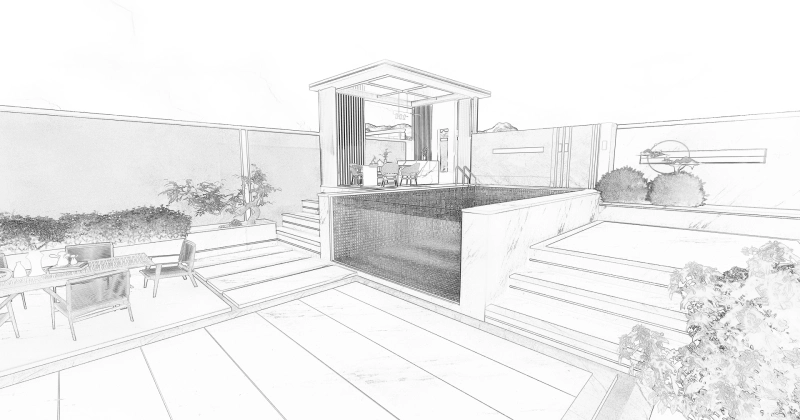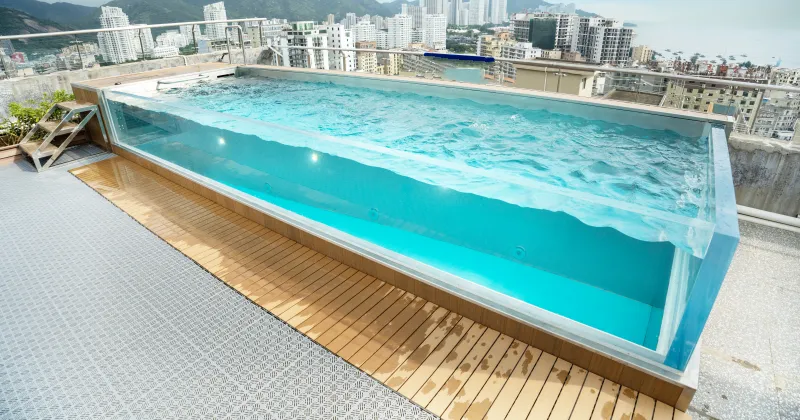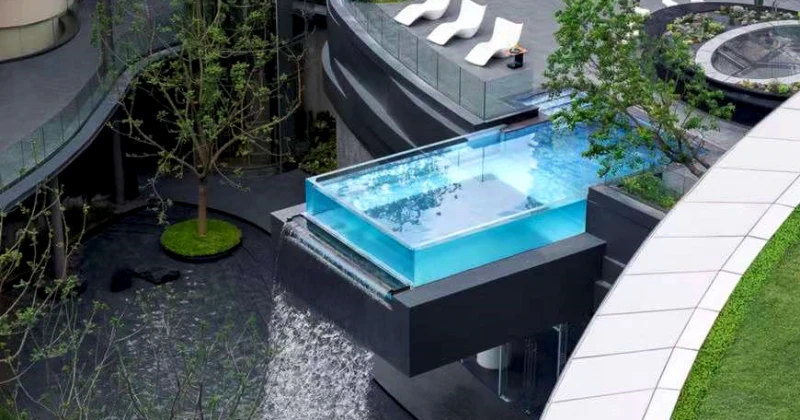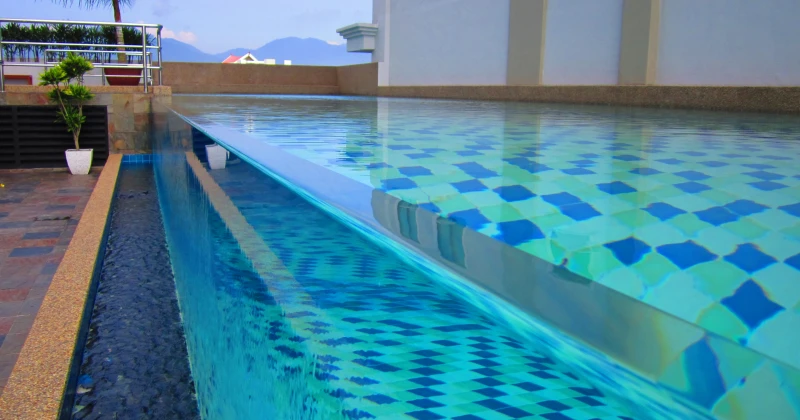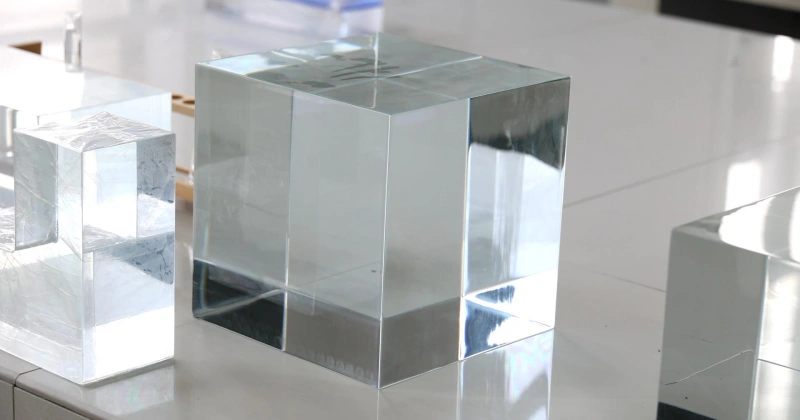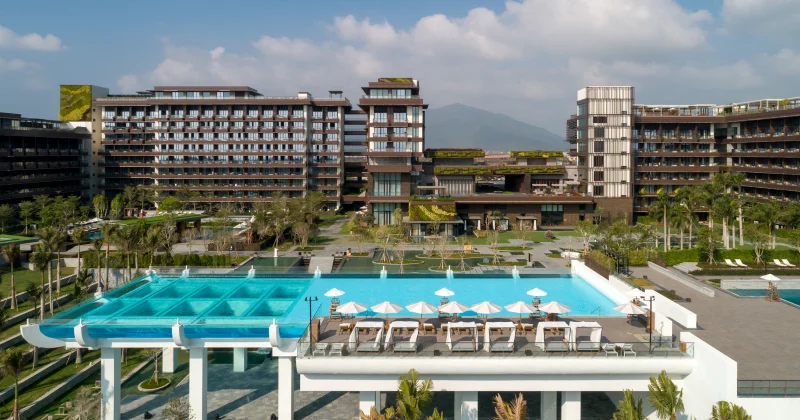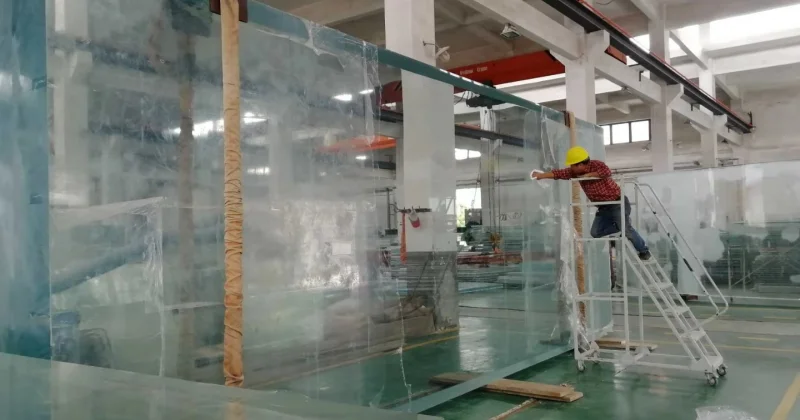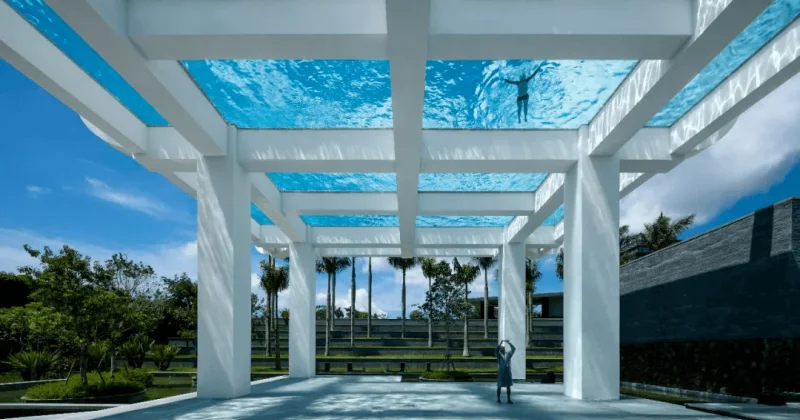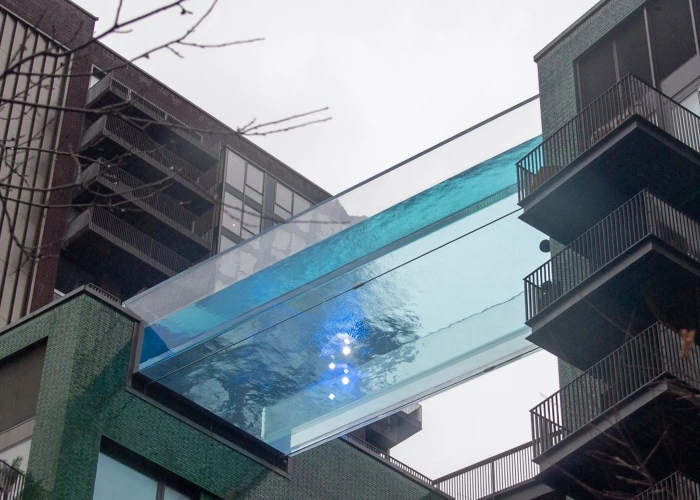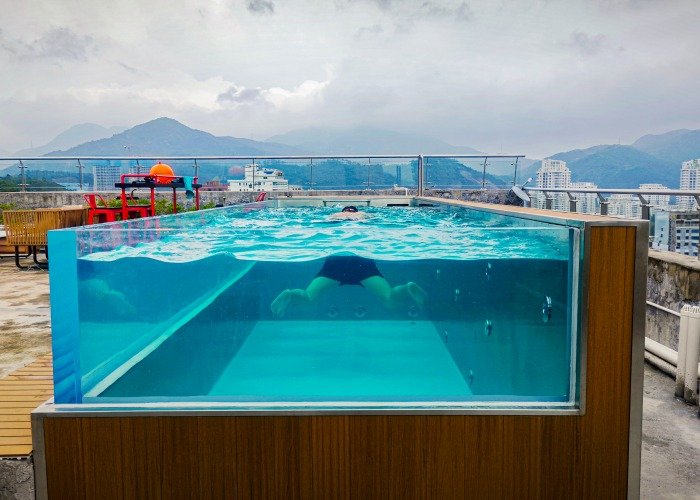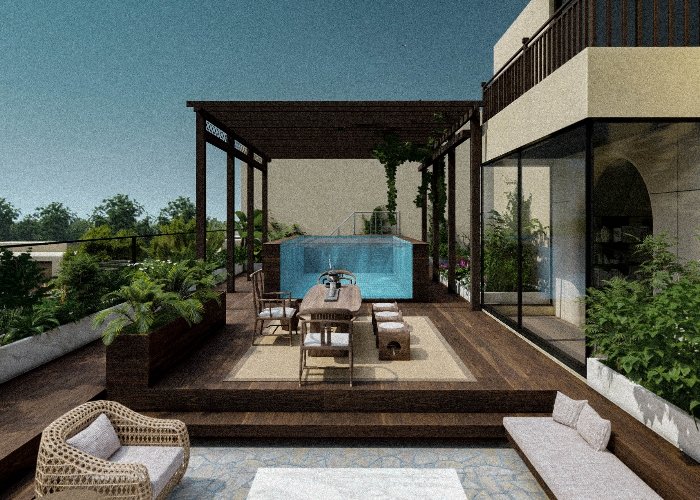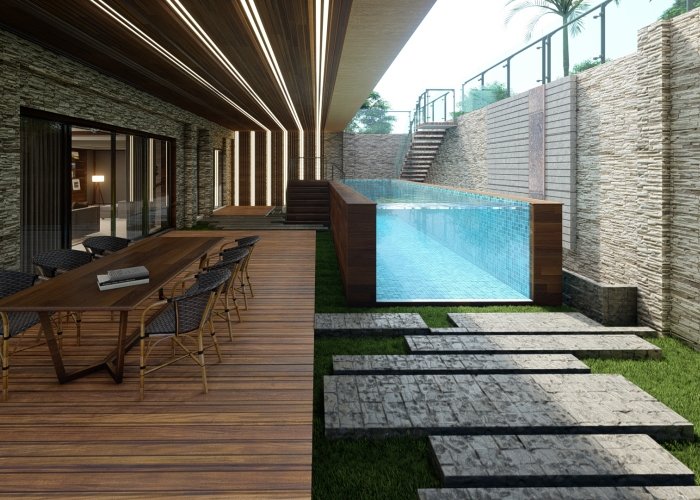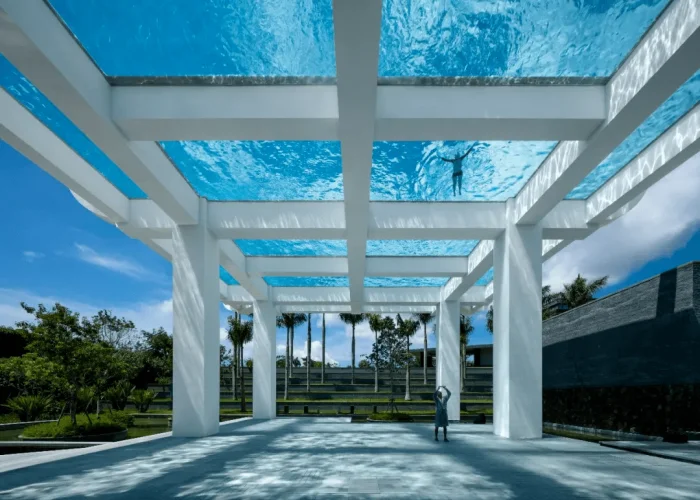
Acrylic vs Glass Pool Windows: A Comprehensive Guide for Your Home
Pool windows have become a striking element in modern architectural design, not only adding a unique charm to your home but also creating breathtaking underwater visual effects. When choosing pool window materials, acrylic and glass are the two main options. This article will comprehensively compare the characteristics of these two materials to help you make the best choice for your home.
Want to see more acrylic pool window designs in action? Check out our gallery of completed acrylic window projects!
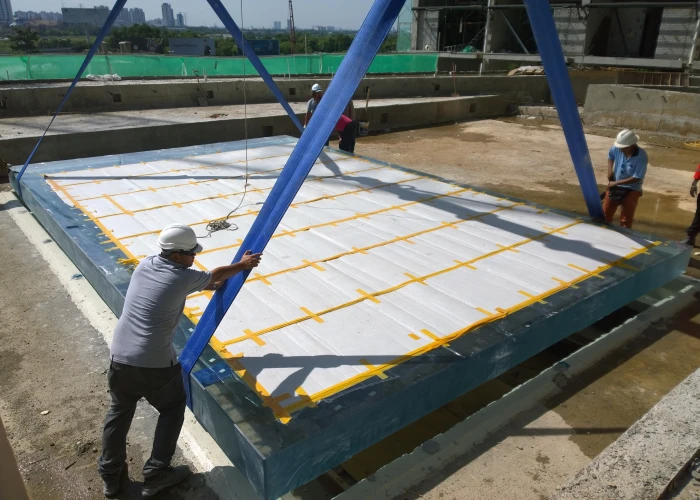
1. Weight and Installation
Acrylic: The Lightweight Champion
- Low Density: Acrylic is about half the density of glass, making acrylic pool windows much lighter than their glass counterparts of the same size.
- Easy Installation: The lighter weight means a simpler and safer installation process. Workers can more easily handle and position acrylic panels, reducing installation risks and labor intensity.
- Transportation Advantage: Due to its lightweight, transporting acrylic pool windows usually costs less than glass. This is particularly beneficial for projects requiring long-distance transportation.
- Structure-Friendly: The lightweight nature puts less pressure on building structures, which is especially important in older buildings or those with limited load-bearing capacity.
- Maintenance Convenience: If future maintenance or replacement is needed, lightweight acrylic panels are easier to handle, reducing operational difficulties and potential safety risks.
-Curious about installing acrylic pool windows? Get the lowdown on acrylic pool installation here!
Glass: The Traditional Heavyweight
- Heavier Material: Glass has about twice the density of acrylic, meaning glass pool windows of the same size will be much heavier.
- Installation Challenges: The heavier weight may require more manpower and specialized equipment for installation, increasing complexity and cost.
- Transportation Considerations: Due to its greater weight, transportation costs for glass pool windows may be higher, especially for large-sized windows.
- Structural Requirements: May require reinforced building support, especially for large-area glass pool windows, potentially increasing overall project complexity and cost.
- Maintenance Difficulty: Replacing or repairing large glass panels may be more challenging than handling acrylic panels, requiring more specialized equipment and techniques.
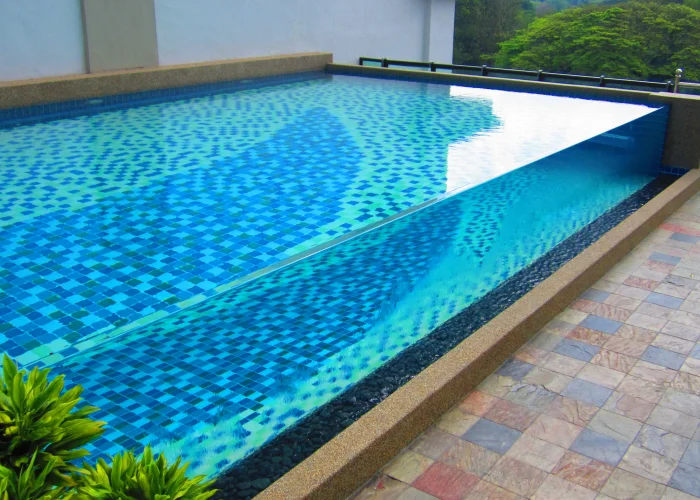
2. Thermal Insulation Performance
Acrylic: The Heat Keeper
- Excellent Insulation: Acrylic has a lower thermal conductivity than glass, better preventing heat loss.
- Energy Efficiency: In cold seasons, acrylic pool windows can better maintain pool water temperature, reducing the energy consumption of heating systems.
- Comfort Enhancement: Due to reduced heat loss, pool water temperature remains more stable, improving swimmers' comfort.
- Condensation Reduction: The excellent insulation properties can also reduce condensation, improving visual clarity and reducing potential moisture damage to surrounding structures.
- Extended Seasonal Use: In colder climates, superior insulation properties can extend the pool's usable season, allowing you to enjoy your pool for longer periods throughout the year.
Glass: Requiring Special Treatment
- Basic Insulation is Poor: Regular glass has inferior insulation properties compared to acrylic, potentially leading to more heat loss.
- Special Treatment Options: Low-emissivity (Low-E) glass or double/triple-pane glass can be chosen to improve insulation, but this increases cost.
- Lower Energy Efficiency: Without special treatment, glass pool windows may lead to higher energy consumption, especially in seasons when pool heating is necessary.
- Temperature Fluctuations: Due to poorer insulation, glass pool windows may cause water temperature to be more susceptible to external temperature changes.
- Condensation Issues: In environments with large temperature differences, glass surfaces are more prone to condensation, potentially affecting visual effects and the surrounding environment.

3. Safety and Impact Resistance
Acrylic: Safety Pioneer
- High Impact Resistance: Acrylic has higher impact resistance than regular glass and is not easily broken.
- Safe Breakage Pattern: Even in extreme cases of breakage, acrylic doesn't form sharp fragments, greatly reducing the risk of injury.
- Child and Pet Friendly: Due to its safety features, acrylic is particularly suitable for families with children and pets.
- Seismic Performance: In earthquake-prone areas, acrylic's elasticity and impact resistance can provide better seismic protection.
- Long-term Safety: Acrylic maintains its safety features better than regular glass over time.
Glass: Safety on Demand
- Regular Glass Risks: Untreated glass has lower impact resistance and may form sharp fragments when broken.
- Safety Glass Options: Tempered or laminated glass can be chosen to enhance safety. Tempered glass breaks into small granules, while laminated glass stays in place even when shattered.
- Situational: Safety depends on the type of glass and treatment method chosen.
- Regular Inspection Needs: Glass may require more frequent safety checks, especially in high-pressure or high-use environments.
- Replacement Considerations: Once cracked or damaged, glass pool windows may need immediate replacement to maintain safety.
Wondering about safety? Is an acrylic glass pool really safe? Find out here!
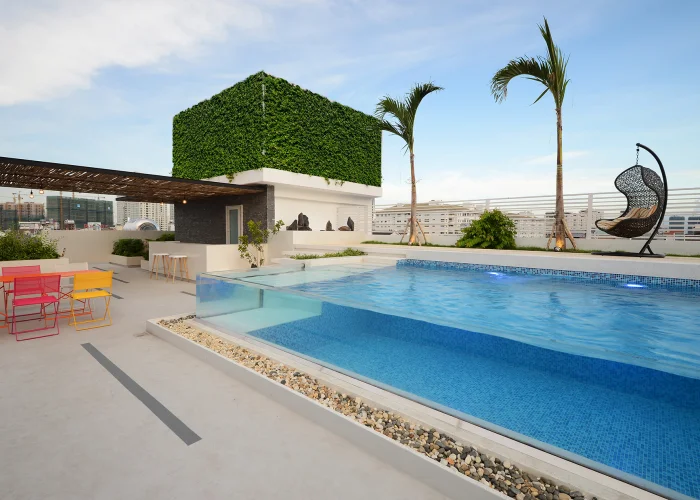
4. Light Transmission
Acrylic: Light Conduction Advantage
- High Transparency: Acrylic can achieve up to 92% light transmission, higher than most glass.
- Clear Underwater Vision: More natural light penetrates the water, providing clearer and brighter underwater views.
- Color Reproduction: High light transmission helps better reproduce true colors in the water, making pool landscapes more vivid and appealing.
- Energy Benefits: More natural light entering indoor spaces can reduce the need for artificial lighting, thus saving energy.
- Plant Growth: If there are aquatic plants in the pool, acrylic's high transparency is beneficial for their growth and health.
Glass: Traditional Transparent Choice
- Good Transparency: Regular glass has about 88% light transmission, slightly lower than acrylic but still providing good visual effects.
- Slight Distortion: Glass may cause slight distortion of underwater scenes, which in some designs might be viewed as a unique aesthetic feature.
- Special Treatment Impact: Some special treatments (such as low-emissivity coatings) may slightly reduce glass's light transmission.
- Stability: Glass's light transmission performance remains relatively stable after long-term use, less affected by environmental factors.
- Diverse Options: Different types of glass (such as ultra-clear glass) can be chosen to optimize light transmission performance.
Check out the showdown: Acrylic vs Glass for pool walls
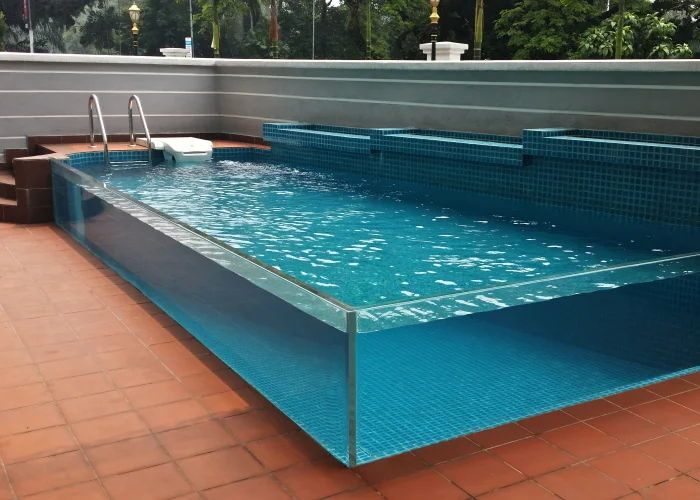
5. Maintenance and Durability
Acrylic: Easy Care
- Smooth Surface: Acrylic surfaces are very smooth, making it difficult for dirt and scale to accumulate.
- Simple Cleaning: Most dirt can be removed with simple wiping, without the need for strong cleaning agents.
- Chemical Resistance: Good resistance to common pool chemicals, not easily corroded or discolored.
- Algae Growth Reduction: The smooth surface is unfavorable for algae attachment and growth, helping maintain clean water quality.
- Potential Scratches: Although generally durable, acrylic may develop fine scratches over time, especially in high-frequency use areas.
Glass: Tough and Wear-Resistant
- Excellent Scratch Resistance: Glass has a higher surface hardness than acrylic, not easily scratched by daily use.
- Long-term Clarity: Even after long-term use, glass surfaces can maintain their original clarity.
- Strong Cleaning: Stronger cleaning tools and methods can be used without worrying about damaging the surface.
- Chemical Sensitivity: Some types of glass may be sensitive to specific pool chemicals, requiring careful selection of cleaning products.
- Professional Maintenance: This may require more professional maintenance methods, especially for large or specially treated glass panels.
Got scratches on your pool's acrylic or glass? Here's how to buff 'em out!

6. Environmental Friendliness
Acrylic: High Production Efficiency
- Low Energy Production: Acrylic production usually requires less energy than glass.
- Lightweight Advantage: Due to its light weight, carbon emissions during transportation are lower.
- Recycling Challenges: Although technically recyclable, the recycling process for acrylic is relatively complex and not as widespread as glass.
- Long Lifespan: Good durability means a longer use life, reducing replacement frequency and thus resource consumption.
- Energy Saving Potential: Excellent insulation properties can help reduce building energy consumption.
Glass: Recycling Champion
- Fully Recyclable: Glass is 100% recyclable and can be recycled indefinitely without losing quality.
- Energy-efficient Production: Using recycled glass to produce new products requires less energy than using raw materials.
- Landfill Reduction: High recycling rates mean less glass ends up in landfills.
- Local Production: Many regions have glass recycling and regeneration facilities, reducing transportation needs.
- Eco-certification: Using recycled glass may help obtain green building certifications, such as LEED certification.
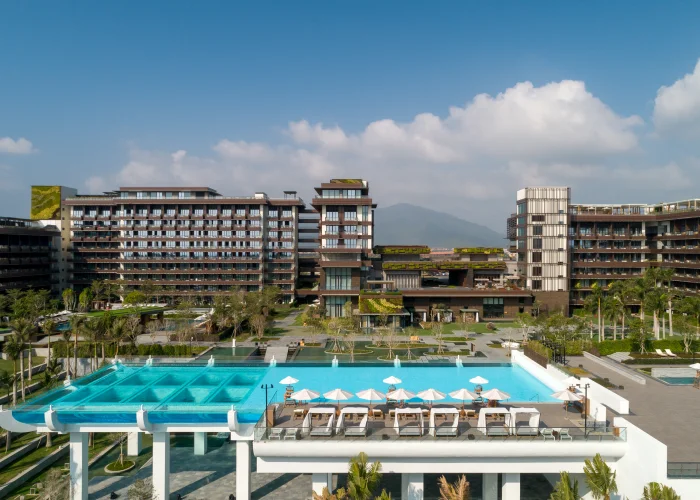
7. Cost Factors
Acrylic: Upfront Investment
- High Initial Cost: The initial purchase cost of acrylic pool windows is usually higher than glass.
- Low Installation Cost: Due to its lightweight, the installation process may be simpler, thus reducing installation costs.
- Energy Savings: Excellent insulation properties may bring long-term energy cost savings.
- Low Maintenance Cost: Simple daily maintenance may reduce long-term maintenance expenses.
- Good Durability: Although the initial investment is high, long life may mean lower lifecycle costs.
Glass: Economical Choice
- Low Initial Cost: The purchase price of glass pool windows is usually lower than acrylic.
- High Installation Cost: Due to its weight, more professional installation equipment and manpower may be required, increasing installation costs.
- Energy Consumption: Unless specially treated glass is chosen, it may lead to higher energy costs.
- Potential Replacement Cost: Although durable, if breakage occurs, replacement costs may be high.
- Maintenance Expenses: May require more professional cleaning and maintenance, increasing long-term maintenance costs.
Thinking of an acrylic glass pool? Let's talk price tags!
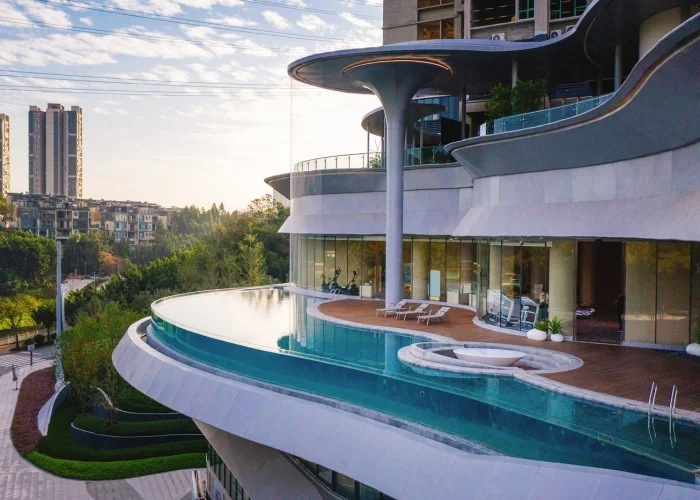
8. Customization Options
Acrylic: Flexible Shaping
- Diverse Shapes: Easily manufactured into various complex shapes and sizes.
- Color Options: Although not as diverse as glass, pigments can be added to achieve different color effects.
- Thickness Customization: Thickness can be easily adjusted according to needs, adapting to different pressure requirements.
- Large Size Possibility: Due to its lightweight, larger seamless panels can be produced.
- Surface Treatment: Can undergo frosting or other surface treatments, though options may be less diverse than glass.
Glass: Versatile Processing
- Rich Variety: Offers multiple types such as tempered, laminated, low-E, etc.
- Diverse Surface Treatments: Can undergo frosting, etching, painting, and various artistic treatments.
- Smart Options: Can integrate smart dimming technology, like electrochromic glass.
- Safety Customization: Different strengths and safety grades can be chosen based on safety requirements.
- Sound Insulation Options: Special glass combinations with sound insulation functions can be selected.
Ready to make your dream pool a splash? Let's dive in!

9. Aesthetic Effects
Acrylic: Ultra-Modern Feel
- Fresh Appearance: Acrylic gives a lighter, more modern feel.
- Frameless Design: Due to its strength, large-area frameless designs can be achieved.
- Optical Clarity: High light transmission brings excellent visual clarity.
- Innovation Potential: Suitable for avant-garde and experimental architectural designs.
- Color Stability: Not prone to yellowing or discoloration over time, maintaining long-term aesthetics.
Glass: Timeless Classic
- Traditional Beauty: Glass possesses a classic, high-end visual appeal.
- Light Effects: Glass can reflect and refract light, creating dynamic visual effects.
- Seamless Integration: Easily coordinates with various building materials and styles, whether modern or traditional.
- Texture Variations: Through different processing methods, various textures can be created, such as frosted, etched, or textured.
- Artistic Expression: Can be transformed into art pieces through techniques like stained glass or interlayer art.
- Fashion Adaptability: The clean look of glass allows it to adapt to changing design trends.
Why Every Luxury Hotel Should Consider Installing Swimming Pool Windows
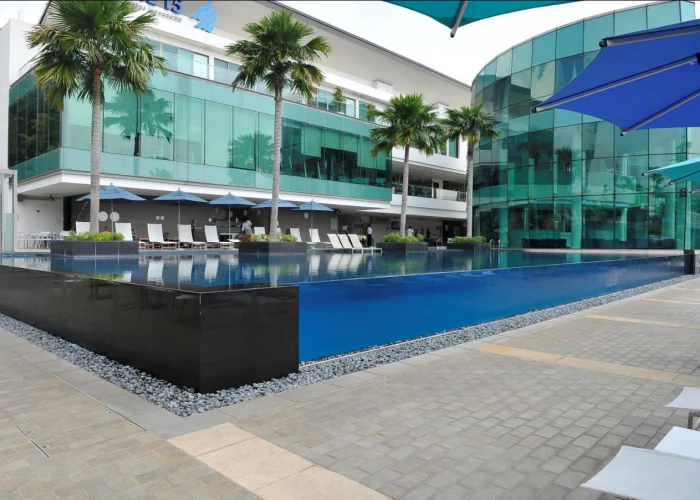
10. Lifespan
Acrylic: Long-Term Durability
- Anti-Aging: High-quality acrylic can maintain its physical and optical properties over the long term.
- UV Resistance: Most acrylic has good UV protection, resistant to yellowing or becoming brittle from sun exposure.
- Corrosion Resistance: Good resistance to most chemicals, not easily corroded by pool chemicals.
- Elasticity Retention: Even after years of use, acrylic can maintain its elasticity without easily deforming.
- Maintenance Extends Life: Simple daily maintenance can significantly extend the lifespan of acrylic pool windows.
Glass: Century-Long Endurance
- Chemical Stability: Glass is an extremely stable material, undergoing almost no chemical changes over time.
- Hardness Retention: The surface hardness of glass does not decrease over time, continuously maintaining its scratch resistance.
- Optical Performance: Properly maintained glass can retain its transparency and optical quality for decades.
- Structural Strength: Especially tempered glass can withstand water pressure and environmental stress for long periods.
- Replacement Possibility: Although long-lived, glass offers easier possibilities for partial replacement.

11. Installation Complexity
Acrylic: Relatively Simple
- Lightweight Advantage: Due to its lightweight, the installation process is usually faster and safer.
- On-Site Processing: Minor cutting and adjustments can be made on-site, increasing installation flexibility.
- Reduced Labor: Usually requires less manpower and lighter equipment for installation.
- Lower Structural Requirements: Lower demands on support structures, potentially reducing preliminary preparation work.
- Simple Sealing: The elasticity of acrylic makes the sealing process relatively simple, reducing the risk of leakage.
Glass: Professional Technical Requirements
- Weight Challenge: The weight of glass requires stronger support structures and more professional installation equipment.
- Precision Requirements: The installation process requires high precision, with a low tolerance for errors.
- Professional Personnel: Usually requires an experienced professional team for installation.
- Safety Considerations: Due to the fragility of glass, extra safety precautions are needed during installation.
- On-Site Limitations: Large glass panels may be difficult to adjust on-site, requiring more precise preliminary measurements.
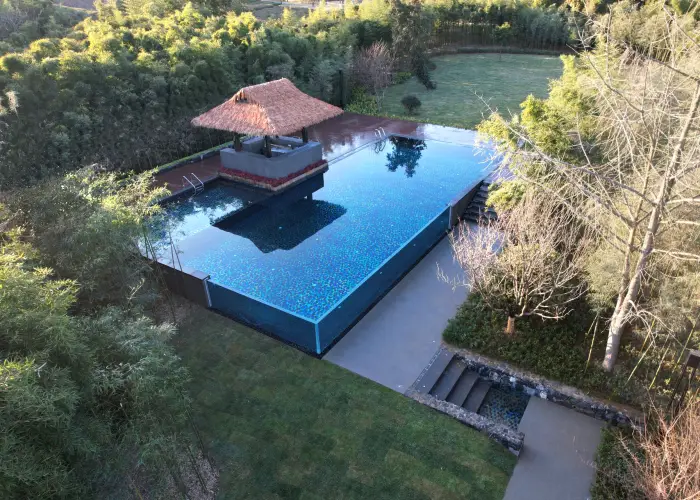
12. Environmental Adaptability
Acrylic: All-Weather Performance
- Temperature Adaptation: Acrylic maintains stable performance across a wide temperature range.
- Good Freeze Resistance: Does not easily become brittle in low-temperature environments, suitable for cold climates.
- Low Thermal Expansion: Dimensional changes due to temperature variations are small, reducing the risk of seal failure.
- Wind Resistance: Lightweight characteristics make it perform well in strong wind environments.
- Humidity Tolerance: Not easily affected by humidity, suitable for indoor pool environments with high moisture.
Glass: Stable but Sensitive
- Temperature Sensitivity: Large temperature changes may cause thermal stress, increasing the risk of cracking.
- Condensation Issues: More prone to condensation in environments with large temperature differences.
- Seismic Performance: Depending on the type of glass, seismic performance may be better or worse than acrylic.
- Acoustic Performance: Glass usually has better sound insulation, especially when using laminated glass.
- Sunlight Endurance: Does not yellow with long-term exposure to strong sunlight, but may require special coatings to reduce heat absorption.
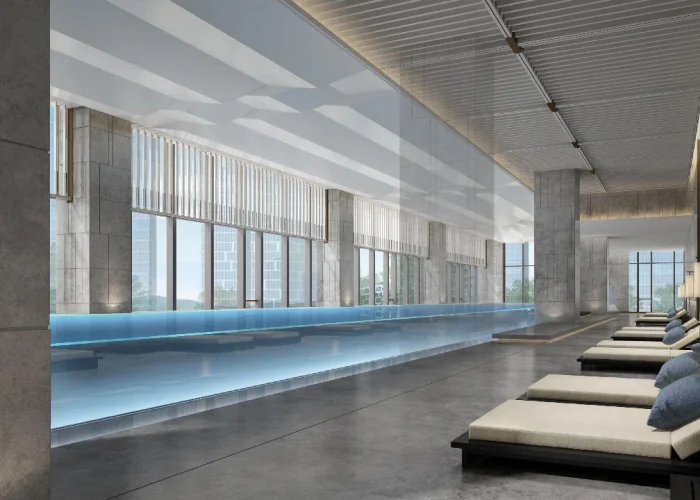
13. Regulatory Compliance
Acrylic: Emerging Material Challenges
- Building Codes: Building codes in some areas may not yet fully cover the use of acrylic pool windows.
- Safety Certification: May require additional testing and certification to prove its safety.
- Environmental Compliance: May face challenges in areas emphasizing recyclability.
- Fire Safety Requirements: Needs special treatment to meet fire safety standards.
- Evolving Standards: As the material becomes more common, relevant standards and regulations may continually update.
Glass: Mature Standard System
- Widely Recognized: The use of glass in construction has mature standards and regulations.
- Safety Standards: Clear safety glass standards exist, such as requirements for tempered and laminated glass.
- Energy Efficiency Regulations: Many regions have energy efficiency standards for glass windows, which are easy to comply with.
- Fire Compliance: The fire resistance performance of glass usually meets most building code requirements.
- International Standards: Glass products typically conform to internationally recognized quality and safety standards.
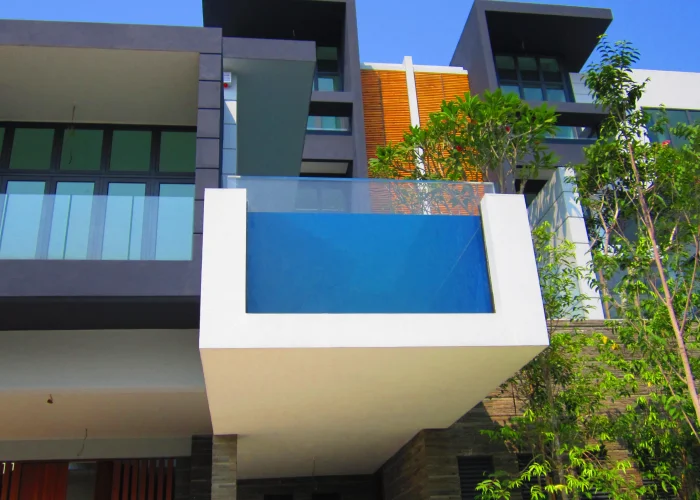
Summary of Consideration Factors:
1. Safety Priority: Assess your specific safety needs, especially in environments with children and pets.
2. Budget Constraints: Consider initial costs, installation costs, and long-term maintenance and energy costs.
3. Climate Conditions: Choose the most suitable material based on the climate characteristics of your area.
4. Usage Frequency and Mode: Consider the frequency of pool use and potential contact methods.
5. Aesthetic Preferences: Choose the material that best fits your overall design concept.
6. Long-term Maintenance Plan: Evaluate whether you are willing and able to perform the required maintenance.
7. Installation Complexity: Consider whether your building structure and installation conditions are suitable for the chosen material.
8. Environmental Factors: If environmental protection is an important consideration, weigh the environmental impact of both materials.
9. Customization Needs: Consider whether you need special shapes, sizes, or treatments.
10. Local Regulatory Requirements: Ensure your choice complies with local building codes and safety standards.
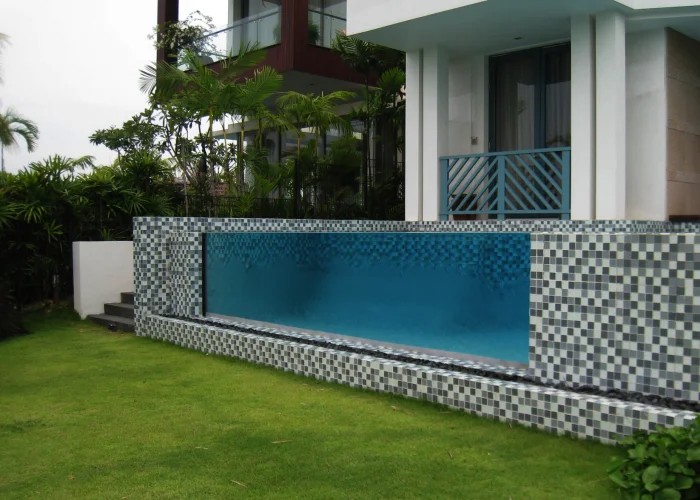
Conclusion:
There's no absolute right or wrong in choosing between acrylic and glass pool windows. This decision should be based on your specific needs, budget, environmental conditions, and personal preferences. Acrylic stands out for its lightweight, excellent thermal insulation performance, and safety, particularly suitable for applications requiring these characteristics. Glass, on the other hand, is known for its durability, diverse processing options, and classic aesthetics, potentially more suitable for certain specific design requirements and environments.
Before making a final decision, it's recommended that you:
1. Carefully evaluate all the above factors and assign weights to each factor based on your specific situation.
3. If possible, personally visit projects using both materials to experience their visual effects and actual performance firsthand. This can help you better understand the pros and cons of each material in practical applications.
4. Consider long-term use and maintenance costs, not just the initial investment.
5. Check local building codes and insurance requirements to ensure your choice meets all necessary standards.
Finally, regardless of which material you choose, a well-designed and correctly installed pool window will add unique charm and value to your home. It's not just a practical building element, but also a focal point that can bring endless fun and aesthetic appeal. Through careful selection and proper care, your pool window will become a stunning feature in your home, bringing years of enjoyment to you and your family. Remember, the best choice is one that balances aesthetics, practicality, safety, and budget while considering your long-term usage needs.
Unmatched Quality and Durability:AUPOOL's Acrylic Glass Pool Innovations






